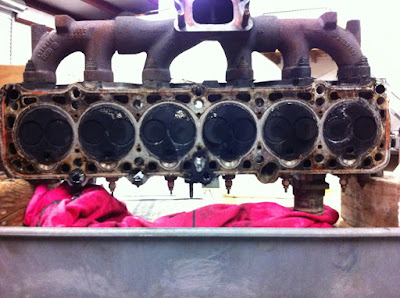- Rebuilt fuel injectors:
 |
| Before |
 |
| After 5 hrs in ultrasonic cleaner & wire brushing |
- Replaced head gasket:
 |
| Original block and pistons (with gasket) |
 |
| Prepared block and pistons (with new gasket). I used the old head bolts to make alignment pins. |
 |
| Original head |
 |
| Prepared head (light cleaning) |
 |
| Homemade alignment pins: I cut the bolts heads off and cut a slot into the top of the original bolts. |
- Rebuilt the deteriorated engine wiring harness. The factory routed the harness underneath the oil pan and beside the oil filter, so that every time the oil filter is changed, the wires get covered in oil. I routed it along the firewall.
- Advanced the injection timing about 5 degrees from the factor specification.
- Replaced the water pump o-ring
- Replaced the injection pump timing belt
- Replaced the camshaft timing belt.
Total time required: 34 hrs.
wow, I have the same engine in my car.
ReplyDeleteWhat is the benefit of advancing the injection by 5 degrees and is there a risk of stressing the engine to much?
Nick?
ReplyDeleteDan,
ReplyDeleteSorry for the delay.
The goal is to increase thermal efficiency, I want better fuel economy. With diesels (indirect or direct) and other direct-injected engines, the valves don’t have to be open to inject fuel into the combustion chamber. Advancing the fuel injection timing causes the fuel to enter the combustion chamber earlier, which means it will combust sooner. In theory, thermal efficiency is increased when additional energy (in the form of heat) is successfully extracted from the combusted fuel. If the fuel is injected sooner, thus combusts sooner, then the engine will have more time to pull the heat (energy) from it before exhausting it to the atmosphere.
If the fuel is injected too earlier, there is a possibility of detonation, which would destroy the engine over a period of time. They are many obvious symptoms of this, I was not concerned.
The Bosch VE pump on this engine dynamically advances the timing with increased RPM (the famous Bosch P7100 is static). I advanced the timing by offsetting the initial timing, this enabled timing advance across all RPM. Low-end torque decreased, but top-end power increased. The famous diesel “knock” is more audible at idle with increased timing.
Fuel economy @ ~75 MPH: ~37 MPG
Fuel economy @ ~65 MPH : ~39 MPG.
Thanks,
Nick